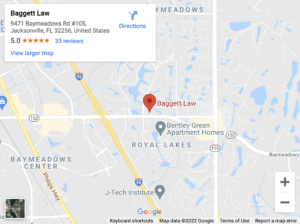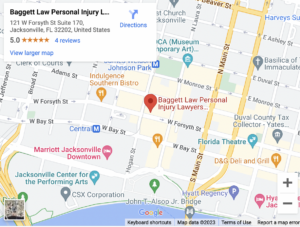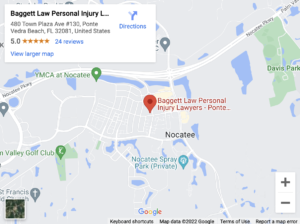
After a car accident, the insurance adjuster for the at-fault driver may offer you a settlement amount for your car accident case. However, before accepting a car accident settlement, there are some things you should know to protect your right to receive compensation stemming from car accident injuries.
Five Things to Know Before You Sign a Car Accident Settlement Agreement

Car accident settlement agreements prepared by the insurance company for the other driver rarely benefit you. So before you sign an agreement settling your claim for a car crash, consider these five things:
1. Initial Settlement Offers Are Often Lower Than the Value of Your Claim
The insurance company wants to limit its liability for the accident. The claims adjuster protects the best interest of the insurance company. Therefore, the initial settlement offer is generally much lower than the value of your claim, especially if you have not consulted a Jacksonville personal injury lawyer.
The insurance company counts on the fact that most people do not understand personal injury laws and how much their car accident claim is worth. Therefore, they make quick, low settlements to convince people to settle their car accident claims. They know you may need money after being out of work because of car accident injuries, and they take advantage of that fact.
You can protect yourself by knowing the value of your claim. Before agreeing to a car accident settlement, talk with a car accident attorney. Ensure you understand how much your claim is worth so that the insurance company does not take advantage of you.
2. You Have the Right to Negotiate a Settlement Amount
You are not legally required to accept the amount the insurance company offers you to settle your case. You can make a counteroffer for a higher amount. From that point, you may go back and forth with the insurance company until you agree on a fair settlement amount.
Before making a counteroffer, gather evidence supporting the amount you demand to settle the claim. For example, provide copies of medical bills, a statement from your employer for lost wages, and a description of the struggles and pain you experienced because of the injury.
Determine the lowest amount you will accept to settle the claim. Then, make a counteroffer for a higher amount to leave room to negotiate. The insurance company may accept the counteroffer or offer you a lower amount.
If the insurance company refuses to pay an amount equal to or higher than your hard line for settlement, seek legal advice about your options for pursuing the claim in court.
3. You Release All Parties From All Claims When You Sign a Settlement Agreement
Car accident settlement agreements are legally binding contracts. You need to read the fine print and understand all legal terms used within the contract. If you make a mistake, you will not be able to change your mind.
Settlement agreements prepared by the insurance company release it, the driver, and all parties from any liability for the car accident, your injuries, financial losses, and all damages.
In other words, you give up your right to pursue the claim in court even if you discover additional damages. Even if you were not aware that you sustained a permanent disability or that another party could be financially liable for a portion of your damages, you could not pursue a claim. You gave up that right when you signed the car accident settlement agreement.
You can protect yourself by waiting until you complete medical treatment before negotiating a settlement for your car accident. Your physicians provide you with a statement regarding maximum medical improvement (MMI). Some people are fully recovered when they reach MMI. Other people may reach MMI and have long-term impairments or disabilities that are not expected to improve with continued medical treatment.
You are entitled to future damages if you have permanent impairments because of the car wreck. Future damages could include, but are not limited to:
- The cost of ongoing medical care and treatment, including additional surgeries and therapies
- Long-term nursing and/or personal care
- Future lost wages and decreases in earning capacity
- The cost of necessary medical equipment and modifications to your home or care because of a disability
Additionally, you should receive compensation for ongoing pain and suffering, reduced quality of life, and loss of enjoyment of life caused by the impairment.
4. The Settlement Amount May Not Cover All Damages
The settlement amount offered by the insurance company might not include compensation for all damages. For example, insurance companies focus on economic damages, such as medical bills and lost wages. However, they may not include other financial losses, including over-the-counter medications, travel expenses, and other out-of-pocket costs.
Insurance companies might also use the dollar amount of your medical bills reduced for insurance purposes or self-pay. The settlement amount should include the total amount billed by the medical provider before any reductions have been applied.
The insurance company might downplay your pain and suffering or non-economic damages. Those damages include:
- Emotional distress
- Mental anguish
- Physical discomfort
- Scarring and disfigurement
- Impairments and disabilities
- Reduced quality of life
- Loss of enjoyment of life
You can protect yourself by keeping detailed records of all expenses and costs related to the car accident, your injuries, and your recovery. Then, talk with a personal injury lawyer to ensure you understand the damages you are entitled to receive by law before agreeing to a final settlement.
5. You Have the Right to Pursue Your Claim in Court
The Florida statute of limitations for filing most personal injury lawsuits has recently changed. The deadline is four years for accidents occurring on or before 3/23/2023, and it is two years otherwise. If the insurance company refuses to negotiate a fair settlement for your car accident case, you can file a lawsuit. A lawsuit forces the insurance company to defend its insured driver against the allegations of liability.
A car accident lawsuit might take longer to resolve, but it might be your only option if the insurance company acts in bad faith or is stubborn about paying a fair amount for your damages.




